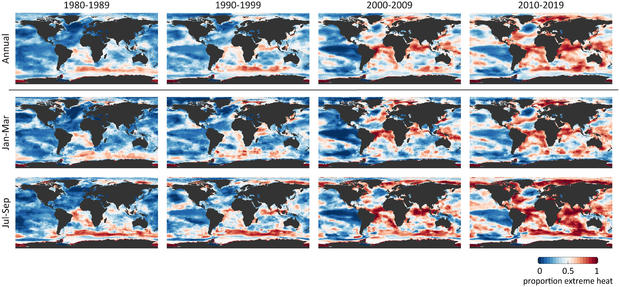150 years of data prove extreme marine heat is the
Researchers have mapped 150 years of ocean temperatures, collected since 1870, to find that exceedingly warm ocean temperatures — caused by climate change — have become the “new normal.” The study, published in PLOS Climate and conducted by the Monterey Bay Aquarium, found that half of the ocean’s temperatures have been measured above the extreme heat threshold “on a regular basis” since 2014.
The scientists used the older data to determine a historical benchmark for the highest temperatures on the ocean’s surface — a heat extreme — and then looked at how often, and how much of the ocean, surpassed that benchmark.
The scientists determined the benchmark by finding the most dramatically hot temperature extremes for the ocean’s surface over a period spanning 1870 to 1919, including only the top 2% of temperature recordings. They defined this number as “extreme heat” and compared it to temperatures we have recorded in recent years.
In 2014, for the first time, more than half the ocean surface surpassed the heat benchmark at the same time. The trend worsened, with 57% of the ocean exceeding the benchmark in 2019, the last year included in the study’s analysis. When scientists applied the same benchmark to the end of the 1800s, just 2% of the ocean temperatures were over that mark.
“These dramatic changes we’ve recorded in the ocean are yet another piece of evidence that should be a wake-up call to act on climate change,” Dr. Kyle Van Houtan, leader of the research team during his tenure as chief scientist for the aquarium, said in a press release. “We are experiencing it now, and it is speeding up.”
“Today, the majority of the ocean’s surface has warmed to temperatures that only a century ago occurred as rare, once-in-50-year extreme warming events,” Van Houtan added.
Tanaka, Van Houtan/PLOS Climate https://doi.org/10.1371/journal.pclm.0000007.g001
The now common extreme heat, researchers say, can put delicate and crucial marine ecosystems at risk of collapse. Coral reefs, seagrass meadows, and kelp forests were named as ecosystems facing particular danger. Scientists say the loss of these ecosystems also takes a toll on local human communities.
“Altering ecosystem structure and function threatens their capacity to provide life-sustaining services to human communities like supporting healthy and sustainable fisheries, buffering low-lying coastal regions from extreme weather events, and serving as a carbon sink to store the excess carbon put in the atmosphere from human-generated greenhouse emissions,” Van Houtan said.
The research team added that the regularity of extreme heat highlights the necessity of lowering emissions from fossil fuel use, which is a key driver of climate change.
“Climate change is not a future event,” said Van Houtan. “The reality is that it’s been affecting us for a while. Our research shows that for the last seven years more than half of the ocean has experienced extreme heat.”
Download our Free App
For Breaking News & Analysis Download the Free CBS News app
For all the latest World News Click Here
For the latest news and updates, follow us on Google News.


